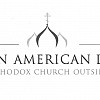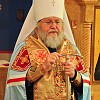DECREE № 6E/2020
His Eminence KYRILL Archbishop of San Franciso and Western America has issued Decree 6E/2020 in which he provides a directive for liturgical practices to be followed at all parishes, monsteries and missions of the Diocese in regions "where new government quarantine restrictions relating to the coronavirus have made it impossible / illegal to serve public services for a time." Printable version of Decree No 6E/2020 here.
To the Clergy of the Western American Diocese:
Below, are directives to the priests of the Western American Diocese, regarding the ongoing provision of Divine Services and the Holy Mysteries in regions where new government quarantine restrictions relating to the coronavirus have made it impossible / illegal to serve public services for a time. While our policy is that we continue to serve all the Divine Services as normal in every location where this is not made strictly impossible by new quarantine laws, we are nevertheless confronted with the fact that, as of this week, the local governments have begun in great haste issuing new restrictions. In all of them (to date), they do not explicitly demand that Churches be closed, but they do in one form or another make it illegal to have group gatherings — in many cases of more than three-five people. While this means that we can keep the doors of the churches open for the faithful for personal devotions, this obviously makes the normal public celebration of the Divine Services impossible; thus the following directives are for clergy of parishes in such affected areas, permitting us not to follow the example of some of the other churches and simply annulling the celebration of all services entirely, but instead to ensure that the Divine Services may continue in a “private” form that also allows the faithful to have access to the Divine Mysteries. The directives issued to the priests are below.
DIRECTIVES TO DIOCESAN CLERGY:
In light of these realities, and the developments in regions that can change very rapidly from one day to the next, I am issuing the following directives to all of our parishes:
FOR ALL DIVINE SERVICES WHEN THEY OCCUR:
Parishes, where group assemblies are not prohibited by new restrictions, should continue to celebrate the Divine Services, including the Liturgy, as always, instructing people to be attentive to the following points:
- Faithful should be encouraged to practice attentive, good hygiene, including washing their hands regularly, avoiding unnecessary interpersonal physical contact, etc.
- Icons may be venerated as normal, and blessings from clergy taken and received as normal, as each individual feels comfortable.
- At the Divine Liturgy, following Holy Communion (which itself will be served and distributed as usual) the zapivka should be served from individual paper or plastic cups that can be disposed of afterwards.
IN PLACES WHERE GOVERNMENT RESTRICTIONS DO NOT PERMIT GROUP GATHERINGS FOR DIVINE SERVICES:
In places where government restrictions prohibit such group gatherings for a time (and there are many, and the status changes daily) the following is to be done in regions where it is permitted:
- Firstly, I am to be notified of the local circumstances immediately, via telephone, by the rector of each affected parish, if it becomes the case that you believe the local governmental situation now requires that customary services cannot take place. I will then bless the following provisions be put in place for your parish, with immediate effect (which may be modified according to the specific local situation):
- The priest will serve a ‘private’ Divine Liturgy on Sunday morning, accompanied by only a single Reader/singer, very early and with the doors of the church closed so that faithful who are unaware of the restriction do not arrive and inadvertently create a ‘group gathering’ that might cause the parish to be completely closed by local authorities.
- During this ‘private’ celebration of the Liturgy, after the consecration of the Holy Gifts and his own communion in the normal manner, the priest shall prepare the “NI” and “KA” portions of the Body of Christ in the way that he would for a Presanctified Liturgy (infusing the Blood into the Body, but not placing these in the chalice of Christ’s Blood). If necessary, multiple Lambs maybe consecrated and prepared in this manner, as is customary on Sundays in Great Lent. At the conclusion of this “private” Liturgy, the priest shall use the spear to cut up these portions into small pieces, as one would do for taking communion to the sick; and these portions shall be placed either on a diskos or in a chalice without wine, ensuring they are covered and protected properly.
- Thereafter, throughout the Sunday and indeed throughout the entirety of the week, the faithful may come individually to the Church (thus not constituting a ‘group gathering’) — and the priest should make himself ready to receive the faithful all throughout the week at convenient times for them — in order to confess and receive Holy Communion. The priest must impress upon the faithful the essential necessity of preparing to receive the Sacrament in the same way as they would for doing so at the Presanctified Liturgy: i.e. through fasting from the night before, etc. When they arrive, the priest will hear their confession, then administer Holy Communion in the manner that customary for giving communion to the sick, from these portions of the Body with Blood that were prepared on Sunday. Afterwards, zapivka should be given to the communicant from a paper or plastic cup that can be thrown away.
- The above practice shall be maintained for as long as government restrictions prohibit group assemblies; as soon as the government policies change, you must contact me immediately via telephone for instruction on reverting to a normal practice, or for other counsel.
- So long as the above are being done, the practice of celebrating the Presanctified Liturgy is superseded by these arrangements, which are done instead: since the Presanctified Liturgy is a rite for making the Holy Gifts accessible to a group of faithful during Lent, it is not necessary to serve it when such groups cannot, by definition, be in the church. The above practice will be done instead.
In this manner we shall be able to adhere to the law as it pertains to restrictions upon public gatherings and communal religious celebrations, whilst still preserving the means of giving the faithful access to the Life-Creating Mysteries of Christ, and not depriving them from the Sacraments of the Church in a troubling time.
CONCERNING THE CELEBRATION OF HOLY UNCTION:
In places where the communal celebration of services is prohibited for a time, this will also make the celebration of General Unction (soborovanie) impossible, as it is by definition a group rite.
IF THE LOCAL AUTHORITIES IN YOUR REGION PROHIBIT ALL RELIGIOUS CELEBRATIONS ENTIRELY:
If, God forbid, it should come about that your local government should put in place a policy that would make even the above impossible, effectively closing churches entirely in your region, you must contact me immediately to discuss this situation and our pastoral response to it.
If you have any questions, please let me know. God bless you and give you peaceful hearts.
Do not be afraid!
KYRILL, Archbishop of San Francisco and Western America
4/17 March 2020
|
| |||||||||||||











